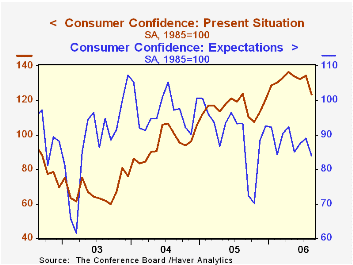 Global| Aug 29 2006
Global| Aug 29 2006Consumer Confidence Fell Sharply
by:Tom Moeller
|in:Economy in Brief
Summary
The Conference Board reported that consumer confidence in August fell a sharp 6.9% to 99.6, its lowest level since November. The July level was revised up slightly but Consensus expectations had been for a more moderate decline in [...]

The Conference Board reported that consumer confidence in August fell a sharp 6.9% to 99.6, its lowest level since November. The July level was revised up slightly but Consensus expectations had been for a more moderate decline in August confidence to 102.9.
During the last twenty years there has been a 52% correlation between the level of consumer confidence and the y/y change in real consumer spending. The correlation rose to 66% during the last ten years.
Consumers' assessment of the present situation reversed all of the prior month's modest uptick and fell 8.0% (-0.3% y/y) to the lowest level (123.4) this year. The percentage of respondents who viewed business conditions as good (26.1%) fell though the percentage that viewed jobs as hard to get (21.1%) rose to its highest level this year.
The index measuring consumers' expectations fell 5.7% (-10.2% y/y). Expectations for better business conditions worsened to the lowest (15.9%) since October and fewer respondents expected more jobs.
Expectations for the inflation rate in twelve months jumped to 5.5%, the highest level since May.
The Conference Board’s survey isconducted by a mailed questionnaire to 5,000 households and about 3,500 typically respond.
Wealth inequality is vast and growing from the Economic Policy Institute is available here
| Conference Board | August | July | Y/Y | 2005 | 2004 | 2003 |
|---|---|---|---|---|---|---|
| Consumer Confidence | 99.6 | 107.0 | -5.6s% | 100.3 | 96.1 | 79.8 |
Tom Moeller
AuthorMore in Author Profile »Prior to joining Haver Analytics in 2000, Mr. Moeller worked as the Economist at Chancellor Capital Management from 1985 to 1999. There, he developed comprehensive economic forecasts and interpreted economic data for equity and fixed income portfolio managers. Also at Chancellor, Mr. Moeller worked as an equity analyst and was responsible for researching and rating companies in the economically sensitive automobile and housing industries for investment in Chancellor’s equity portfolio. Prior to joining Chancellor, Mr. Moeller was an Economist at Citibank from 1979 to 1984. He also analyzed pricing behavior in the metals industry for the Council on Wage and Price Stability in Washington, D.C. In 1999, Mr. Moeller received the award for most accurate forecast from the Forecasters' Club of New York. From 1990 to 1992 he was President of the New York Association for Business Economists. Mr. Moeller earned an M.B.A. in Finance from Fordham University, where he graduated in 1987. He holds a Bachelor of Arts in Economics from George Washington University.
More Economy in Brief
 Global| Feb 05 2026
Global| Feb 05 2026Charts of the Week: Balanced Policy, Resilient Data and AI Narratives
by:Andrew Cates






